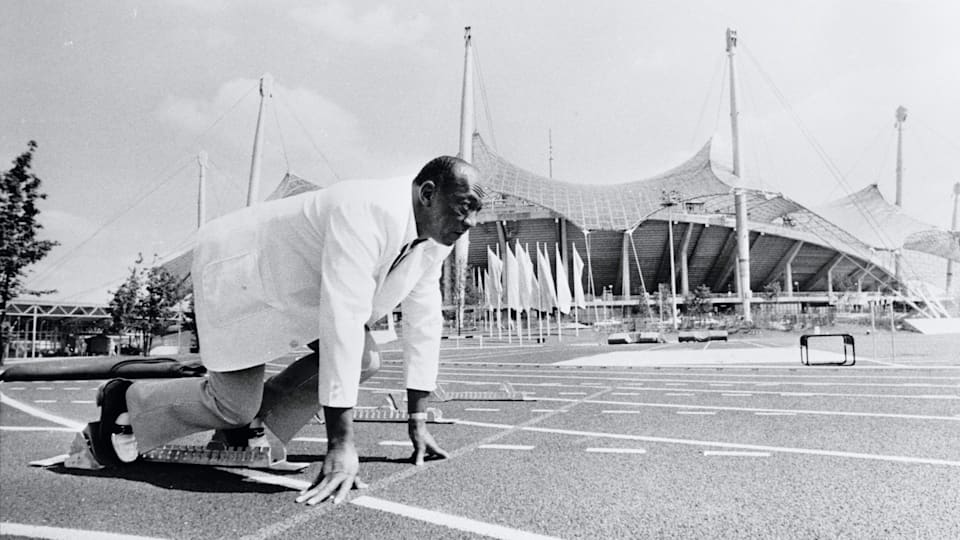From horse-racer to speech writer: Jesse Owens’ life after the Olympic Games
Jesse Owens returned home from the Berlin 1936 Olympic Games with four gold medals but no guarantees for his future prosperity. From working at a petrol station to racing against amateurs for cash, he endured many tough times, but eventually the man from Alabama reaped some reward for his brilliance and bravery.

“People say it was degrading for an Olympic champion to run against a horse, but what was I supposed to do? I had four gold medals, but you can't eat four gold medals."
So said Jesse Owens in later life when reflecting on the challenges he faced and the decisions he took after returning home from the Berlin 1936 Olympic Games as one of the USA’s most successful men’s track and field athletes of all time.
The four-time gold medal winner declined an invitation to compete in Sweden immediately after the Games with fellow 1936 stars. The 22-year-old’s head had been turned by several lucrative commercial offers back in the USA. It proved a decision with considerable ramifications.
Owens’ amateur status was swiftly withdrawn, which effectively ended his athletics career. Concurrently, Owens found people’s memories to be short. Within months of his return the commercial offers dried up and with no opportunity to remind the public of his brilliance on the track, life became difficult.
Having married his childhood sweetheart, Ruth, while at Ohio State University and having had his first daughter prior to his exploits in Berlin, Owens had to earn money. And fast.
Naturally, he fell back on his extraordinary talent. He challenged small-time sprinters at local meets to races for cash, giving them a 10-20 yard-head start before beating them comfortably. He also raced against motorbikes, cars, trucks and finally, horses.
I had four gold medals, but you can't eat four gold medals Jesse Owens - Jesse Owens
Reflecting back on this time in later life, Owens admitted finding the fall from glory hard to take.
“Sure it bothered me,” he said. “But at least it was an honest living. I had to eat.”
Owens also reverted to the type of employment that had supported him through Ohio State, when the absence of a sports scholarship had forced him take a $100/month job as a lift operator. In the years after his Berlin heroics, Owens was variously a petrol station attendant, playground janitor and manager of a dry cleaning firm.
The challenges facing the Alabama native were not limited to matters of finance. Civil rights issues were a major factor in his everyday life. In the immediate aftermath of the 1936 Games Owens was invited to a ticker-tape parade and celebration in his honour at New York’s Waldorf-Astoria hotel. He had to take the freight lift to get there.
“I came back to my native country and I couldn’t ride in the front of the bus. I had to go to the back door. I couldn’t live where I wanted,” Owens reflected years later.
Nor did he get the official recognition he, and others, felt he merited. The US President of the time, Franklin D Roosevelt, did not contact Owens by telephone or telegram to offer his congratulations, nor did he invite the multiple gold medallist to the White House.
It was in the 1950s that things started to change for Owens and his family. He began to give speeches to corporations and bodies including the Ford Motor Company and, in time, the US Olympic Committee. He opened his own public relations business as he became a sought after figure, travelling across the USA emphasising the importance of sportsmanship, health and love for one’s country.
According to reports at the time, Owens became a powerful orator and in later life he earned as much as $100,000 per year for giving two to three speeches per week. He was a “kind of all-round super combination of 19th century spellbinder and 20th century plastic PR man, fulltime banquet guest, eternal glad-hander and evangelistic small-talker,” according to an article by journalist William Oscar Johnson in Sports Illustrated.
In 1976 presidential recognition finally arrived, with Gerald Ford awarding Owens the Presidential Medal of Freedom. Once the tap was open the honours flowed. In 1979 President Jimmy Carter bestowed the Olympic champion with the Living Legend Award. And in 1990 George HW Bush posthumously awarded Owens the Congressional Medal of Honour.
Always a keen walker and swimmer, Owens amusingly decried those men and women who continued to run well into their senior years.
I don’t jog because I can’t run flat-footed. And at 60 years old you are crazy to be out there running Jesse Owens - Jesse Owens
“I don’t jog because I can’t run flat-footed. And at 60 years old you are crazy to be out there running,” he said.
At the age of 66 Owens died of lung cancer in Tucson, Arizona. He was survived by his wife and three daughters. The tributes poured in but maybe none summed up his life and quite remarkable achievements in the face of adversity better than a single sentence from President Carter.
“Perhaps no athlete better symbolized the human struggle against tyranny, poverty and racial bigotry,” the President wrote.
